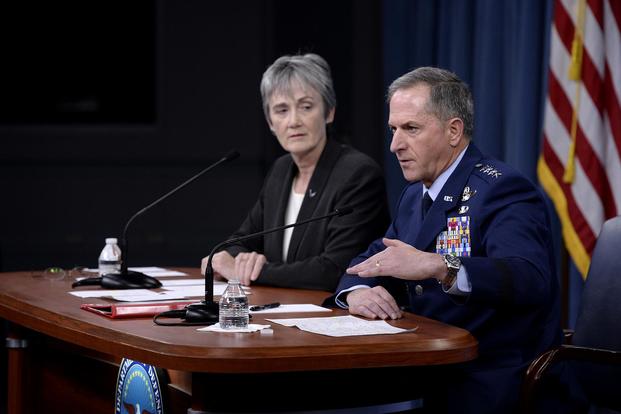President Donald Trump's proposed idea of a Space Force has lawmakers on Capitol Hill once again asking the U.S. Air Force if a separate space unit in the Pentagon is feasible.
During a House Appropriations Defense subcommittee hearing Wednesday, lawmakers asked the Air Force's top general and top civilian why the idea was shot down before and what the stipulations would be if it is resurrected.
Air Force Secretary Heather Wilson instead outlined how the service's space budget propels the Pentagon's mission forward against emerging threats such as Russia and China, who may not be coming into the domain in a peaceful way.
"As the president said yesterday, the new National Defense Strategy for space recognizes that space is a warfighting domain. We appreciate the president and the vice president's leadership on space," Wilson said, alongside Air Force Chief of Staff Gen. David Goldfein.
Related content:
- US Air Force Preparing for War in Space
- Old School Air Force Can't Handle 'Space Corps' Challenge?
- Lawmakers: Military's Space Corps Could Launch Within 3 Years
"This [Air Force] budget accelerates our efforts to deter, defend, and protect our ability to operate and win in space. There are a number of different elements of this with respect to the space -- the space portfolio," she said.
There is no question space is a warfighting domain in need of better protection, one which the Air Force has overseen since the mid-1950s, Goldfein said.
"As a joint chief, I see that same responsibility as the lead joint chief for space operations -- is making sure that we have those capabilities that the joint team requires. And so, as the president stated openly, this is a warfighting domain," Goldfein said. "That is where we've been focused. And so I'm really looking forward to the conversation."
On Tuesday, Trump revealed he recently had an idea for a "space force," or separate military service for space.
During a visit to troops at Marine Corps Air Station Miramar, California, Trump said, "Because we're doing a tremendous amount of work in space, maybe we need a new force. We'll call it the space force."
Trump's comments come a few months after the Air Force thought it was done talking about a separate military force for space, one that lawmakers have pushed the service to stand up in hopes of taking adversarial threats in space more seriously.
Rep. Mike Rogers R-Ala, and Rep. William "Mac" Thornberry, R-Tx, in June first created language in the fiscal 2018 National Defense Authorization Act which would have required the service to stand up a "U.S. Space Corps."
Soon after, Goldfein, Wilson and even Defense Secretary Jim Mattis attempted to dissolve the idea, citing costliness and organizational challenges.
And while lawmakers ultimately removed language requiring such an overhaul of the Air Force's mission, they still required a study of the idea and also backed changes to the management of the space cadre.
Rogers and other key lawmakers think it is still possible to stand up Space Corps within three to five years, and have still chastised the Air Force for not doing something like it "yesterday."
At a Center for Strategic and International Studies event earlier this month, Rogers and Rep. Jim Cooper, D-Tenn., warning that the situation in space is increasingly dire because Russia and China are waiting in the wings to exploit America's vulnerabilities.
"The situation we are in as a nation, the vulnerabilities we have to China and Russia, I'd like for the American public to know more, [but] I can't because I don't want to go to jail for leaking classified info. But we're in a really bad situation," Rogers said at the time.
"When you asked about deadline, timeline, think about yesterday," Cooper said. "You know, even the chairman's answer of three to five years, we fought and won World War II in five years. Remember that our defense budget is really not set by us; it's set by our adversaries. Our bureaucratic changes should not be determined at our convenience, but at what's necessary."
-- Oriana Pawlyk can be reached at oriana.pawlyk@military.com. Follow her on Twitter at @Oriana0214.










